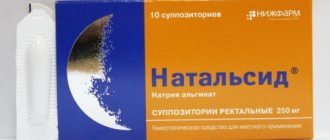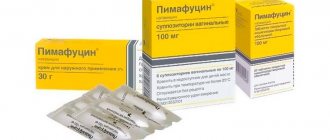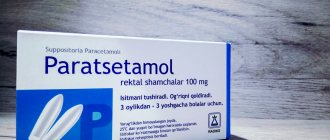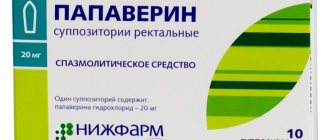A pregnant woman has a very weakened immune system due to hormonal changes occurring in her body. As a result, various diseases and unpleasant problems arise. One of them is hemorrhoids. It appears due to constipation, which the expectant mother has to deal with in the first and last trimesters of pregnancy. This occurs due to the active effect of progesterone on a woman’s body, which suppresses the muscle activity of the uterus, intestines, and organs of the genitourinary system. Special ointments and suppositories help to cope with these problems. In this article we will provide you with instructions for using a drug during pregnancy such as Relief.
Causes of the appearance and exacerbation of hemorrhoids in pregnant women
Hemorrhoids are classic varicose veins, differing only in that they are located in the anorectal area.
The disease is accompanied by:
- Painful sensations.
- Itching.
- Bleeding.
If you have the disease, you should not undergo serious physical activity, as this can lead to an exacerbation, and you need to follow a diet. For pregnant women, these restrictions are difficult, since the development of the fetus requires adequate nutrition, and a woman’s weight gain can be automatically equated to physical activity.
Hemorrhoids can appear even before pregnancy; in this case, carrying a child only provokes an exacerbation of the disease and an increase in hemorrhoidal cones. Sometimes pregnancy itself becomes the cause of hemorrhoids, because in this case ideal conditions are created for it.
Here are the main reasons for the appearance of hemorrhoidal cones in pregnant women:
- A woman’s weight gain due to fetal development and hormonal changes in the body.
- Enlargement of the uterus and, as a result, an obstruction to the outflow of blood from the pelvic vessels.
- Increased intra-abdominal pressure.
- Restriction of a woman’s physical activity, which leads to impaired blood flow.
- Difficulty with bowel movements.
This simply creates greenhouse conditions for the growth of cones in the anorectal area, so Relief during pregnancy in the 1st trimester and beyond should be used regularly.
In what cases is it prescribed for pregnant women?
These medications are prescribed for pregnant women quite often because they quickly have a therapeutic effect without causing significant harm.
Indications for the use of Relief drugs are similar, including internal, external inflammation and vasodilation, accompanied by the following symptoms:
- constipation;
- cracks, itching and burning of the anus;
- healing of erosions and eczema in the anal area.
"Relief Advance" is also used as a pain reliever for severe tissue damage, before proctological examinations and procedures.
Before use, the doctor must clarify that the pregnant woman does not have certain diseases, since Relief ointments and suppositories have contraindications:
- thyroid disease (hyperthyroidism);
- high blood pressure;
- granulocytopenia (reduced number of granulocytes in the blood);
- thromboembolism (blockage of blood vessels);
- persistent metabolic disorder;
- increased sodium levels in the blood;
- increased sensitivity.
When prescribing Relief Advance, the main restrictions relate to hypersensitivity, thromboembolism and granulocytopenia.
How to deal with hemorrhoids during pregnancy
An expectant mother should not give up when hemorrhoids are detected or worsened, so the disease must be fought.
For this, doctors recommend:
- Regular walks without heavy physical activity (no carrying heavy bags or lifting other heavy objects).
- Follow a diet.
- Use the drug Relief.
If there is a combination of hemorrhoids + pregnancy, you should not eat spicy seasonings and rice cereals, but it is recommended to increase the amount of fruits and vegetables. It is also good to add dried fruits to your diet and drink more clean, still water than usual. Rule No. 1 is maximum fiber, which will prevent constipation and reduce pressure on hemorrhoids.
In the 3rd trimester of pregnancy, use Relief Advance, which is effective as a medicinal drug and will not harm the health of the fetus and the expectant mother. The drug with the Advance prefix contains shark liver oil, which helps to increase the effectiveness of treatment.
In parallel with the diet, suppositories or Relief ointment are used during pregnancy for hemorrhoids in the 3rd trimester or earlier, depending on the stage of gestation. Note that Relief is used without problems in any trimester; you will learn about the contraindications of the drug at the end of the article.
The drug will not be superfluous after childbirth, when the disease often worsens.
A combination of medications (as prescribed by a doctor), diet and a healthy lifestyle will help you overcome hemorrhoids, approach childbirth fully equipped and not experience significant discomfort after it.
Is it possible to Relief during pregnancy?
This medication can today be found in the form of an ointment or rectal suppositories. It has a local hemostatic and analgesic effect, and also promotes wound healing. But hemorrhoids during pregnancy are a special case. A pregnant woman should be as careful as possible with the use of any medications, because they can harm the health of both her and the unborn baby.
According to the manufacturers of the antihemorrhoidal drug Relief, this medicine boasts a natural composition. Therefore, the likelihood of developing side effects, according to the manufacturer, is negligible, which allows the drug to be used by pregnant and nursing mothers. Indeed, the main component of the Relief drug is shark liver oil. It was used for medicinal purposes two centuries ago - even then, Norwegian fishermen discovered that shark liver oil accelerates wound healing and reduces the likelihood of inflammation. In turn, phenylephrine, which is also part of the drug Relief, has a local vasoconstrictor effect, and this helps reduce swelling. In addition to the main components, rectal suppositories also contain cocoa butter - it has a softening effect.
However, with all the advantages that the manufacturer talks about, the instructions for use of the drug Relief say in black and white: “Use with caution during pregnancy and lactation.”
More on the topic
Suppositories for hemorrhoids after childbirth
How and when to use Viburkol suppositories during pregnancy?
Suppositories for hemorrhoids during pregnancy
Pimafucin suppositories during pregnancy
Polygynax suppositories during pregnancy
Some doctors actually do not recommend this drug during pregnancy: according to them, it is unknown how Relief can affect the fetus. Doctors explain: both active ingredients of the drug can pass from the mother’s blood into the fetus’s blood. It is completely unknown whether and how exactly the shark’s liver can affect the body of the expectant mother and child. But phenylephrine, which is part of Relief and easily penetrates into the general bloodstream, can lead to increased blood pressure and heart rhythm disturbances (due to its vasoconstrictor effect), and therefore pregnant women suffering from hypertension or other problems with the cardiovascular system it cannot be used.
However, there is no data on any specific harmful effects of the drug on the body of a pregnant woman and the fetus. Therefore, as in the case of any other drugs prescribed by a doctor to a pregnant woman, in each individual case the issue must be approached on an individual basis.
How Relief can help pregnant women
Relief suppositories and ointment are combined preparations that use several active substances, the combined effect of which makes it possible to defeat hemorrhoids.
The drug allows:
- Relieve painful sensations.
- Reduce swelling in the anorectal area.
- Stop the bleeding.
- Get rid of itching.
- Prevent inflammatory processes.
Using Relief during pregnancy in the 2nd trimester, you can pass the peak of gestation more easily and begin preparing for childbirth without a pronounced feeling of discomfort.
Advantages and disadvantages of the drug
The main advantage of these medications is the natural composition and effectiveness of the pharmacological action, which helps relieve pain and inflammation, rapid regeneration of damaged tissue, and stop bleeding. But the effect of drugs on the fetus has not been fully studied, and this is a significant disadvantage.
In addition, they may cause some side effects, such as:
- allergic manifestations;
- severe anal itching;
- redness and irritation of the skin and mucous tissues.
This mainly concerns cases of illiterate use of medications.
Particularly unpleasant consequences can occur if the dosage or frequency of use of Relief Advance is exceeded. A woman may experience a state of anxiety, drowsiness, and in case of a serious overdose, increased excitability, convulsions, cyanosis and impaired respiratory function.
In some cases, pregnant women experience hypercoagulation - increased blood clotting. Such a clinical picture, in any case, can negatively affect the child’s condition.
Composition of ointment and suppositories Relief
Suppositories and Relief ointment differ in the components of their composition, but both drugs are quite effective in the treatment of hemorrhoids in pregnant women.
Relief candles include:
- Phenylephrine hydrochloride 5 mg.
- Cocoa butter 1770 mg.
- Corn starch 224 mg.
- Propyl parahydroxybenzoate 0.4 mg.
- Methyl parahydroxybenzoate 0.4 mg.
An important role is played not only by the main active substance phenylephrine hydrochloride, but also by cocoa butter, which softens the skin in the anal area and prevents the appearance of anal fissures.
The composition of Relief ointment includes (per 1 gram):
- Phenylephrine hydrochloride 2.5 mg.
- Mineral oil 140 mg.
- Anhydrous lanolin 23.5 mg.
- Benzoic acid 2 mg.
- Corn oil 2 mg.
- Glycerol 25 mg.
Also contains propyl parahydroxybenzoate, methyl parahydroxybenzoate, vitamin E, beeswax and thyme oil (1 mg).
As a percentage, the proportion of the active substance phenylephrine hydrochloride is 0.25%, the proportion of petroleum jelly is 74.9% or 749 mg per 1 gram of ointment.
Suppositories are inserted into the anus in the morning, afternoon and evening; in case of exacerbation of hemorrhoids, 4 suppositories can be used per day.
Relief ointment during pregnancy in the 3rd trimester and previous stages is used after bowel movements 3-4 times a day.
Contraindications and side effects
During pregnancy, be sure to check with your doctor whether you can use Relief suppositories. The drug has several contraindications for use. These include:
- hypernatremia;
- diabetes;
- tuberculosis;
- hyperthyroidism;
- thromboembolic disease;
- granulocytopenia;
- arterial hypertension;
- allergy to the components of the medicine.
Contraindications to the use of the drug directly depend on the series of the drug and the components that are included in the composition. Among the ingredients of ointments and suppositories is phenylephrine. According to the principle of action, this substance is similar to adrenaline. It provokes a sharp narrowing of blood vessels, as a result of which swelling is eliminated, and bleeding, itching and pain are reduced.
Phenylephrine is effective, but it is very quickly absorbed into the rectum, and from there it enters the blood. As a result, it sometimes causes a general vasoconstrictor effect. Because of this, the expectant mother may experience surges in blood pressure, and sometimes heart rhythm disturbances. Judging by the reviews of expectant mothers, Relief suppositories often give this effect during pregnancy.
Relief Ultra is prohibited for use during pregnancy and lactation. Its active components can cause disturbances in a woman’s body, which will have an extremely negative impact on the health of the fetus. Deep Relief is also prohibited, since serious problems can develop under the influence of the active substances of the drugs. Relief Advance ointment can be used during pregnancy, but only after the advice of a specialist. Reviews indicate that the product perfectly eliminates severe burning and itching in the anus.
Side effects of the drug also depend on the form of release and series of the drug. The product can cause allergic reactions: rash, burning and itching in the anus. If ointment or suppositories are used for too long, the skin in the area of application may turn red.
That is why the drug should be used only under the supervision of a specialist. Side effects usually occur when the patient does not comply with the dosage of the drug and exceeds the treatment period prescribed by the doctor.
Read the instructions before use
Judging by the reviews of women who were treated with Relief during pregnancy, adverse reactions do not always appear. To avoid them, you need to consult a doctor and inform him of the slightest changes in your health. Usually two weeks of treatment for hemorrhoids are enough for positive changes to appear.
If after a course of treatment the patient has bleeding, you need to urgently call a specialist. This often indicates a risk of pregnancy. The woman must be urgently hospitalized in a hospital hospital.
Despite the fact that Relief has a lot of side effects, it is one of the most effective means for treating rectal fissures, hemorrhoids and other lesions of the anus.
| Trimester | Indications for use | Contraindications |
| 1st trimester | The medicine is used to treat proctitis, constipation, eczema, itching in the anus, anal fissures, external and internal hemorrhoids. The drug is also used for pain relief after anal surgery. | Contraindications include the presence of arterial hypertension, granulocytopenia, thromboembolic pathology, hyperthyroidism, tuberculosis, diabetes mellitus, hypernatremia, and allergies to the components of the drug. |
| 2nd trimester | ||
| 3rd trimester |
The whole truth about Terzhinan during pregnancy and all Sinupret products during pregnancy.
Maria Pasternatskaya:
I used Relief suppositories, which the doctor prescribed during pregnancy. I’m glad because only two times was enough for the pain to subside. Used it at night.
Irina Vyrinkova:
I used the popular Relief ointment when hemorrhoids appeared during pregnancy. It helped me, but I didn’t find any difference between other similar products. The main thing is that the symptoms disappeared.
Yulia Belova:
I used Relief, although I didn’t know if it was possible during pregnancy. Such negligence backfired. I developed a severe allergy to the drug. A lesson for life, because you should always consult a doctor.
Causes of the disease
During pregnancy or after childbirth, this disease can often occur in the female half of the population.
First of all, this is due to the weakness of the vascular system of the pelvis, which is subject to high load during such a difficult period. The veins cannot cope with the tension and the walls form knots, which is how external or internal hemorrhoids occur.
Similar problems can arise in a woman before and during pregnancy if she leads a passive lifestyle. Then stagnant processes occur in the venous system and circulatory disorders begin.
Before starting to use Relief for hemorrhoids during pregnancy, it is important for a girl to learn in detail about all the contraindications, warnings and other features of the drug. Only after studying the instructions is the medicine allowed for use.
Reviews about Relief
Most patients who were treated with the drug during pregnancy were satisfied. Most often they used suppositories rather than ointments, and got results within a week.
Oksana, 21 years old. I never thought that I would suffer from hemorrhoids, but when I became pregnant, I was simply horrified. The doctor advised me to buy Relief, and after a few days I saw the effect of the suppositories. Before giving birth, the problem arose again, but the treatment also did not take much time. Now that my baby is already 3 months old, I have completely forgotten about such problems.
Natalya, 32 years old. When I turned to my doctor with such a delicate problem, he immediately prescribed me Relief suppositories. I really liked that the itching quickly went away and the cracks began to heal. A week of use - and everything is a thing of the past.
Use of suppositories
Therapy with Relief rectal suppositories lasts on average two weeks; the more precise duration of treatment is determined by the doctor, based on test results and taking into account the patient’s condition.
The first days of treatment, the dosage for a pregnant woman is 2-4 suppositories per day: in the morning, at night and after each bowel movement during the day. Then the dose is reduced to one suppository per day.
If you experience discomfort while using Relief suppositories, you should stop using the drug and consult a doctor.
Relief by trimester
1st trimester
With great caution in the early stages, doctors prescribe pregnant women the simplest form of the drug, that is, Relief without any prefixes. This form is the weakest, and therefore practically safe for the fetus. But why with caution? The drug contains phenylephrine hydrochloride, which acts like adrenaline, which can negatively affect both the mother’s blood pressure and the development of the fetus.
2nd trimester
The use of weakly active drugs from the Relief series is permitted provided that the mother is familiar with the composition and possible consequences.











